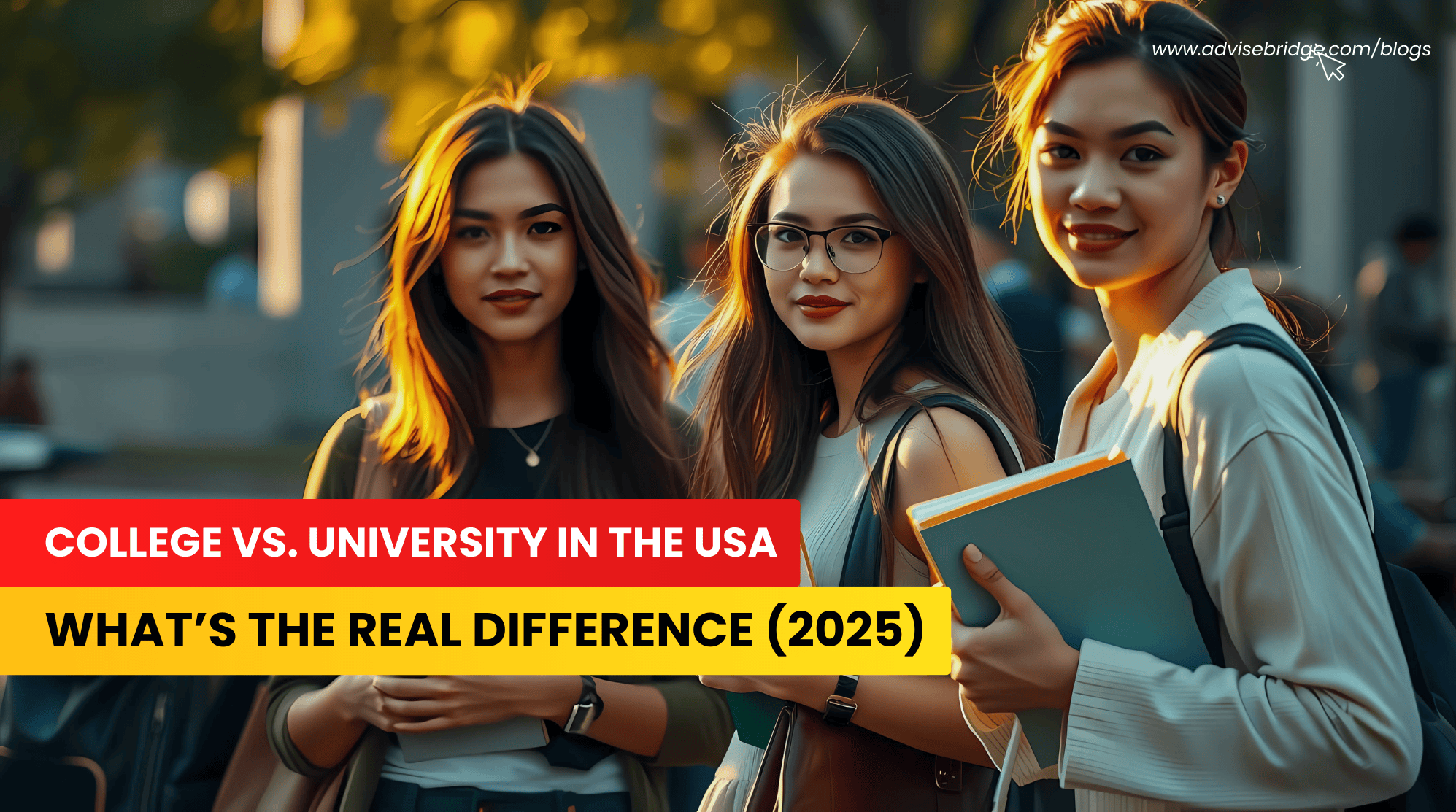If you're planning to study in the USA, you've probably come across both the terms college and university. Outside the U.S., they’re often used interchangeably or understood differently. But in the U.S., understanding the distinction can make a big difference in how you choose your school, your program, and even how you plan your career.
So, let’s unpack the real difference between a college and a university in the United States—and help you confidently decide which path fits you best.
How & Why the Confusion Exist?
In most parts of the world, “university” is the standard term for higher education institutions. But in the U.S., things are different. Americans often use the term “college” even when they’re referring to a university. For example, someone attending Harvard University might still say, “I’m going to college.”
Here’s the key:
“College” can refer to a stand-alone institution that offers undergraduate degrees.
“University” refers to a larger institution that offers both undergraduate and graduate programs, often with multiple departments or “colleges” within it.
So yes, you can attend a college that’s part of a university. Confusing? At first, yes—but we’ll make it clear.
Size & Structure
Another difference you can find among Colleges Vs. Universities in the USA are their Sizes and structures. See it below:
Colleges:
Typically smaller in size
Primarily offer undergraduate programs (Bachelor’s degrees)
Fewer students mean smaller class sizes and more personalized attention
Professors are often focused on teaching, not research
Universities:
Usually larger institutions with thousands or even tens of thousands of students
Offer both undergraduate and graduate programs (Master’s, Ph.D., JD, MBA, etc.)
Composed of multiple colleges or schools (e.g., College of Engineering, School of Business)
Have research departments, labs, and faculty actively engaged in academic research
Example:
The University of California, Berkeley is a university that houses various colleges: College of Letters and Science, College of Engineering, etc. In contrast, Amherst College is a small liberal arts college focused solely on undergraduates.
Types of Degrees Offered
This is a major difference between a College and a University in the United States.
Colleges: Primarily offer Bachelor’s degrees. Some may also offer Associate degrees or limited Master's programs.
Universities: Offer Bachelor’s, Master’s, Doctorate, and Professional degrees (like Law and Medicine).
If you’re interested in advanced study or research, a university may be a better fit. If your goal is a rich undergraduate experience with closer faculty interaction, consider a college.
Academic Experience & Learning Environment
The academic vibe can differ a lot. What you prefer while studying where matters a lot. Here's how:
In Colleges:
More intimate campus environment
Greater opportunity for professor-student interaction
Ideal for students who thrive in smaller learning communities
In Universities:
Access to broader academic resources and facilities
Larger class sizes, especially in the first two years
Wide array of majors, minors, and research opportunities
Ideal for students seeking variety and specialization
Some students love the personal attention at colleges, while others prefer the dynamic, large-scale environment of universities.
Is Tuition Cost Cheaper In Colleges Than Universities?
Many assume that colleges are always cheaper than universities—but that’s not necessarily true.
Public universities (like state universities) often have lower tuition for in-state residents, but higher rates for international students.
Private colleges, even small ones, can have higher tuition, but may offer generous financial aid.
Community colleges (a different category entirely) are often the most affordable and offer two-year Associate degrees.
Key Tip:
Don’t judge cost based on “college vs. university” alone. Check each school’s tuition fees, scholarship options, and total cost of attendance.
Related Blog: Public Vs. Private Universities in the USA- Which is Best For You?
Admission Requirements
Generally, universities can be more competitive in terms of admissions—especially top-tier research universities.
However:
Many liberal arts colleges also have rigorous admissions (e.g., Williams College, Pomona College)
Both institutions may require standardized test scores (SAT/ACT), essays, transcripts, and letters of recommendation
Some colleges are test-optional, and others may offer pathway programs to help international students transition smoothly.
Research Opportunities
Universities are typically more research-intensive.
Offer funded research labs, assistantships, and publications
Often tied to government or industry research grants
Provide students with opportunities to work alongside faculty on cutting-edge topics
That said, many colleges also provide independent research opportunities and focus on developing research skills from early years—just on a smaller scale.
Campus Life & Extracurriculars
Both colleges and universities offer clubs, sports, and student organizations. But the scale differs.
Colleges may have fewer options, but more close-knit communities
Universities boast large campuses with diverse student organizations, big sports teams, and sometimes even campus cities
If you want a bustling, diverse, and international environment—universities can offer that. If you prefer a smaller, more supportive community—colleges shine here.
So, Which is Right for You?
Here’s a simple breakdown:
Factor | College | University |
|---|---|---|
Size | Smaller | Larger |
Degrees | Mainly Bachelor’s | Bachelor’s, Master’s, Ph.D. |
Class Sizes | Smaller | Larger |
Campus Life | Tight-knit, fewer clubs | Diverse, more activities |
Research | Limited, student-focused | Extensive, faculty-led |
Cost | Varies | Varies |
Focus | Teaching | Teaching + Research |
Final Thoughts
Here’s the truth: whether an institution calls itself a college or a university doesn’t always tell you everything. What matters most is:
The quality of the program
Your academic goals
Your preferred learning environment
Your budget and financial aid options
The best advice? Do your research. Explore the school’s offerings, speak to advisors, read student reviews, and if possible, attend virtual tours or open houses.
Whether you choose a college or university in the USA, what really counts is the experience you create while you’re there.
📌Need Help Choosing the Right Institution? At AdviseBridge, we guide students like you in making smart, informed decisions for studying in the U.S. From choosing the right fit to navigating scholarships, we’re here to bridge your journey.







